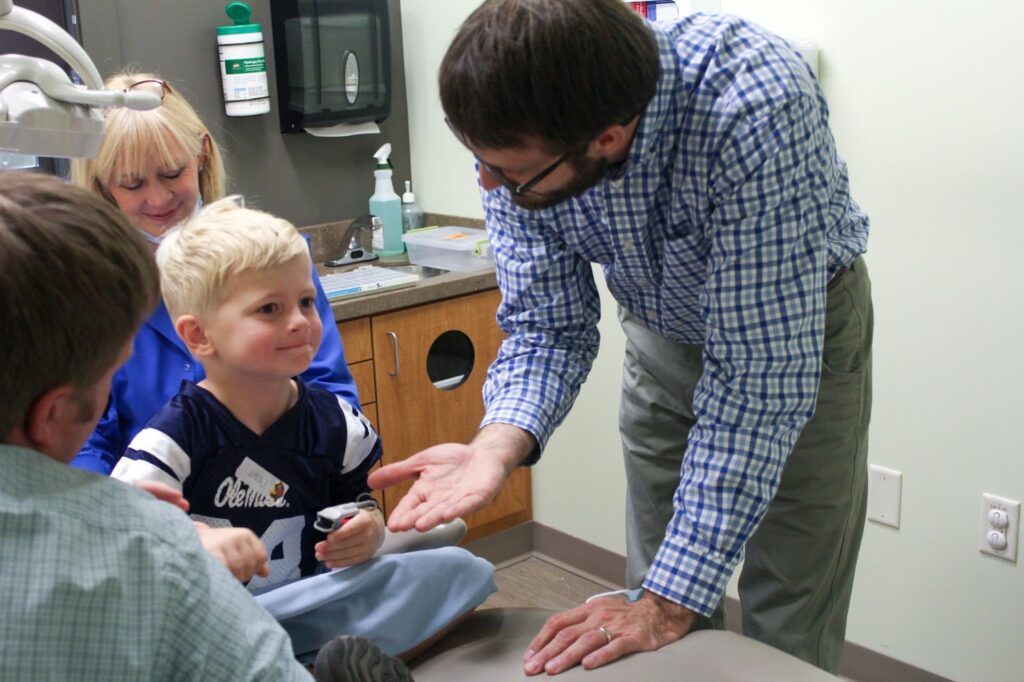Getting kids to care for their teeth doesn’t always come easily. As parents, sometimes you have to get creative. Children’s Dental Center is here to give you some ideas and answer this somewhat maddening question: How can I make brushing and flossing fun for kids?
Why It Matters
Brushing and flossing are key for everyone’s oral hygiene— but kiddos are a special circumstance. Let’s look at why:
- Preventing Tooth Decay: Brushing and flossing removes food particles as well as plaque and bacteria from teeth and gums, reducing the risk of cavities and tooth decay.
- Maintaining Healthy Gums: Proper oral hygiene habits prevent gum disease and inflammation like gingivitis, which can lead to other serious issues if left untreated.
- Supporting Overall Health: Oral health is closely linked to overall health. Poor oral hygiene has been associated with various systemic conditions, including cardiovascular disease, diabetes, and respiratory infections.
- Promoting Fresh Breath: Kids shouldn’t have stinky breath all the time! Removing bacteria helps to keep their breath fresh and helps with confidence in social situations.
- Preventing Dental Pain and Discomfort: Cavities and gum disease cause pain, sensitivity, and discomfort in children. Regular oral care helps them to prevent these issues and ensures a comfortable and pain-free smile.
- Protecting Baby Teeth: Although they’ll eventually fall out, baby teeth play a crucial role in speech development, nutrition, and guiding permanent teeth into the correct position. Proper oral hygiene preserves the health of baby teeth until they naturally exfoliate.
- Setting the Stage for Orthodontic Treatment: Lots of pediatric patients will receive orthodontic treatment like braces or aligners, and good hygiene habits lay a healthy foundation for tooth movement and alignment.
Hygiene with a Twist
Explaining all of that to your kids might not be effective motivation, and that’s okay. Here are some ideas that could help:
- Use Fun Toothbrushes: Let your child pick out their toothbrush with their most beloved cartoon character or color. Electric toothbrushes have built-in timers that can make the process entertaining.
- Sing Songs: Devise a catchy tune or sing a favorite song while brushing their teeth. This can make the experience more enjoyable and allow you to keep time—which should be around two minutes.
- Set Up a Reward System: Create a sticker chart or reward system where your child earns stickers or small rewards for brushing and flossing consistently. This can motivate them to take care of their teeth every day.
- Brush Together: Being alongside them can go a long way. It can become a way of setting a positive example and creating a bonding experience.
- Use Apps or Games: There are many apps and online games made to make oral hygiene fun for kids! These interactive tools can include timers, music, and characters that guide children through brushing and flossing.
- Make It a Challenge: You can turn it into a game by seeing who can brush or floss the “longest” without missing any teeth. Offer praise and encouragement for their efforts.
- Provide Fun Flavored Toothpaste: Choose flavors they enjoy, like bubblegum, strawberry, or watermelon. Just make sure it contains fluoride and is approved by the ADA (American Dental Association) for effective cavity protection.
- Use Floss Picks: This can be an easier solution for kids than traditional floss. They come in different colors and designs as well, which can be appealing.
- Create a Brushing and Flossing Routine: Sometimes, the key is just repetition. Establish a consistent daily routine, preferably after breakfast and before bedtime. Consistency is a great tool for forming good oral hygiene habits.

FAQs
Specific questions are always best directed to your child’s dentist—but let’s try to help you out while you’re here!
Q: When should my child start flossing?
When two teeth are next to each other— so around age two or three.
Q: Are they too young for fluoride mouthwash?
Fluoride mouthwash is a valuable tool. It can be used by kids over the age of six, under adult supervision and as a comprehensive part of their routine.
Q: My child is afraid of the dentist. How can I help?
Use positive language, be thorough in your explanation of what they can expect, and choose a team of experts like our own office. We do our best to put them at ease, especially during initial visits.
Q: When should my child start using toothpaste?
A pea-sized amount can be used when the child is around two years old.

Making It Happen
So yes, this can be a difficult journey for kids—building good habits, understanding the importance of oral health, and so forth. But we’re in this together! If you need to make an appointment for your child, we have three outstanding offices: Midtown, Arlington, and Collierville. You can reach any of them at (901) 245-1990.
